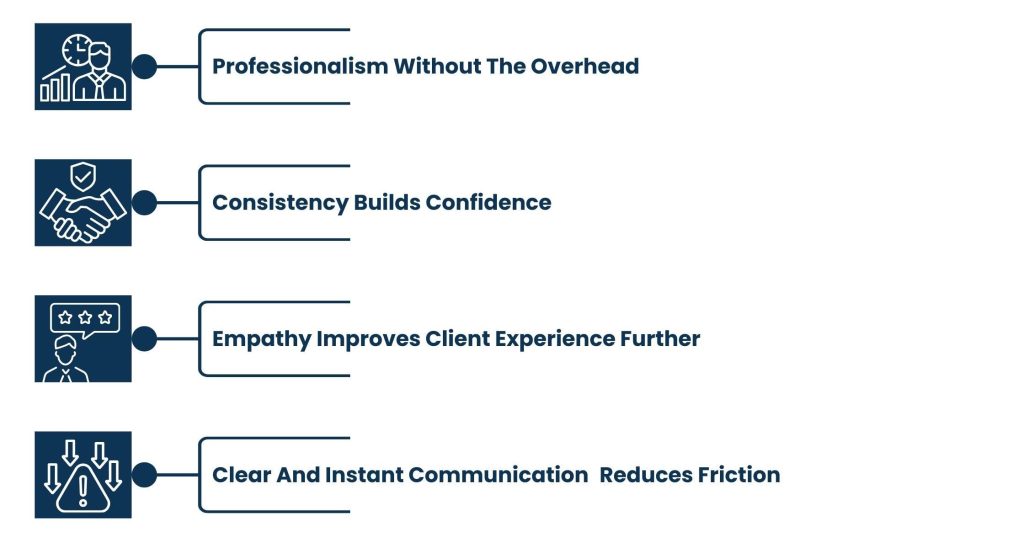Introduction
As a law firm, client trust is the foundation for success. Your firm’s impression starts with the first line of communication with your potential client, tone, professionalism, and responsiveness to requests. However, for small to mid-sized practices, keeping a full-time in-house receptionist on board can be expensive — and at times, unnecessary.
Enter a Law Firm Virtual Receptionist, which is an invaluable asset.
The virtual receptionist is more than just a phone-answerer. They are the face of your business, the keeper of your calendar, and usually the first touchpoint for your clients. With sufficient training and a proper implementation strategy within your firm, a virtual receptionist can deliver a seamless, friendly experience that cultivates long-term trust and confidence with clients.
In this blog, we will discuss what a Law Firm Virtual Receptionist does, how they shape the way clients find your law firm, and why outsourcing this role might just be the best thing your firm ever does.
What is a Virtual Receptionist for Law Firms?
A Law Firm Virtual Receptionist is a remote worker who handles calls, manages appointments, fields first requests for information, and routes client communications on behalf of a law firm. They work from a remote location but are trained in legal etiquette and client confidentiality as opposed to a regular receptionist.
These receptionists typically operate within standard business hours, but some offer after-hours coverage to make sure no call or lead goes unanswered. They use VOIP systems, cloud-based calendars, and secure communications platforms just like an on-site employee — often at far less cost.
The Importance of First Impressions in Legal Services

1. The Client’s Initial Call Establishes the Atmosphere
When a potential client calls a law firm, they are often experiencing a stressful, emotional, or uncertain time in their lives. Whether they are up against criminal charges, separating in a divorce, or contending with a business dispute, they want guidance — and in a hurry.
If this call isn’t picked up or administered, it can instantly diminish their trust in the firm. A Law Firm Virtual Receptionist answers 100% of calls quickly, empathetically, and professionally, so clients feel they are being heard from first contact.
2. Perceived Credibility Starts at the Front Desk
Even if the receptionist is virtual, how he/she greet clients, schedule consultations, and follow up — all communicate the firm’s values. That gloss of professional polish that polished, well-trained virtual receptionists bring reflects well on attorneys and pulls confidence from the legal services rendered.
What Does a Law Firm Virtual Receptionist Do?

1. Call Handling and Screening
Using a professional and friendly tone, the receptionist answers all calls in a timely manner. Call screening is on the basis of urgency; priority issues are directed to attorneys with alacrity, and routine stuff is properly taken care of and scheduled.
Result: Less missed opportunities and more structure with the clients you speak to.
2. Appointment Scheduling and Calendar Management
Using synced digital calendars, virtual receptionists schedule consultations, follow-ups, and internal meetings. They prevent double bookings and remind attorneys of upcoming calls or sessions.
Effect: It increases effective time management & provides a seamless client journey due to prompt follow-ups.
3. Handling New Client Inquiries
New callers typically have questions about legal services, pricing, or next steps. Virtual receptionists are trained to answer basic questions, take down initial information, and assure the client that a lawyer will be in touch soon.
Significant: Eases client concern and builds trust by providing promptly.
4. Handling Call Overflow and After-Hour Support
Virtual receptionists never leave a lead unanswered during working hours and off hours. Calls can be routed to voicemail with follow-up promises or elevated to on-call lawyers under established protocols.
Impact: Drives lead capture and establishes the firm as credible and accessible.
5. Secure Messaging and Confidentiality Compliance
Virtual receptionists are trained to maintain strict confidentiality and appropriately handle messages and sensitive client information. Most work within an encrypted system and are trained when required according to GDPR or HIPAA-like standards.
Impact: Client confidence in the handling of their personal information.
Also Read: Virtual Assistant Services in Saudi Arabia
The Trust Factor: How a Virtual Receptionist Builds Loyalty

1. Professionalism Without The Overhead
A full-time in-house receptionist is an expense for salary, benefits, workspace, and often training. In a lot more economic investment, a virtual receptionist offers the same level of professionalism. These specialists are typically trained in legal customer service and know how to maintain your firm’s good name with every phone call. They act as your brand ambassadors with poise and polish, fielding questions, scheduling appointments, and creating first impressions, all without the overhead and commitment of an in-house employee. It’s a smart way to present professionalism while managing overhead.
2. Consistency Builds Confidence
When clients contact your office, they expect a predictable and professional experience. Caution is key when it comes to dealing with sensitive legal matters. A Law Firm Virtual Receptionist is a reliable presence, providing a consistent experience in all interactions by following the same script, tone, and process. Whether it’s how they answer callers or confirm appointments, or take messages, the consistency creates the perception to clients that yours is a structured, reliable, well-run organization. In time, this cultivates trust and reinforces an image of professionalism. When clients know exactly what to expect from every call and every conversation, they’re more likely to return and refer others.
3. Empathy Improves Client Experience Further
Clients contact law firms often amid emotionally charged, stressful situations. A virtual receptionist trained to display empathy, patience, and active listening can help provide immediate emotional relief, all while keeping things professional. They don’t just pick up the phone—they assure clients, make them feel secure, and mirror the attentiveness that your firm provides. Because of the sensitive nature of family law, criminal defense, and immigration cases, where clients are often feeling distressed or insecure, only a genuine emotional bond will do. A sympathetic virtual receptionist adds that human touch to your firm, giving clients peace of mind long before they ever talk to an attorney_zeroed in on establishing lasting trust and loyalty.
4. Clear And Instant Communication Reduces Friction
In law, there is a necessity for speed and lucidity in the exchange of information. Your clients might be awaiting a critical update, looking for clarity on their appointment schedules, or wanting initial legal advice. Law Firm Virtual Receptionist makes sure that messages are conveyed in real time, appointments are confirmed immediately, and communications are crystal clear and useful. This alleviates some of the stress and doubt that come along with legal proceedings. A well-organized and communicative process improves the overall satisfaction of your clients. Clear communication reduces mistakes, fosters transparency, and demonstrates to clients that you respect their time, which helps your firm be seen as responsive and dependable.
Remote vs. On-Site Flexibility
Virtual receptionists function remotely, providing your law firm with flexibility without the requirement for on-site space. This arrangement is good for small firms and solo attorneys. By contrast, a traditional receptionist requires a physical office space and only works within the office, which may limit accessibility and raise overhead costs.

1. Extended Availability
Your Law Firm Virtual Receptionists provide extended coverage, including after-hours and weekends, so no potential client call goes unanswered. Traditional receptionists are typically employed only during business hours, which leads to lost potential outside the regular 9-to-5 hours.
2. Cost Efficiency
Receptionists are generally able to scale back when business is slow, so you only pay for what you need when you need it, making them a cost-effective solution, particularly for firms that do not require full-time front desk staff. Traditional receptionists entail an increased fixed cost level: salaries, benefits, workspace outlay, and may not return the best ROI for small or scaling firms.
3. Legal-Specific Training
Many providers of virtual receptionists work specifically with legal industry professionals and will have staff members trained in legal terminology, client confidentiality, and the proper handling of any sensitive information. Conversely, traditional hires may require in-house training, oversight, or protocols to ensure that these standards are met, ultimately taking additional time and management energy from the firm.
4. Technology and Integration
Virtual receptionists use a combination of cloud-based tools, VoIP systems, CRM software, and calendar integrations to manage client communication effectively. In many cases, traditional receptionists use manual processes or basic software that can hinder communication flow and reduce productivity in a busy legal environment.
Also Read: Virtual Assistant Services in Al Khafji
Comparison of Virtual Receptionists vs Traditional Receptionists

How To Integrate A Law Firm Virtual Receptionist Successfully

1. Present Clear Call Scripts and FAQs
While having a Law Firm Virtual Receptionist showcases your professionalism, you want to prepare them by providing a branded call script that details the demeanor in which they address your clients, the questions they ask, and the most common scenarios. A Frequently Asked Questions section covering your services, fees, and how you generally operate. This ensures consistency in messaging and allows clients to feel more confident and informed. The more clarity you provide from the outset, the better they reflect your firm’s tone and expectations from day one.
2. Synchronize Calendars and Communication Tools
The effectiveness of a streamlined calendar system is simply that you don’t miss meetings or have conflicting schedules. Synchronization with tools such as Google Calendar, Microsoft Outlook, or legal CRMs like Clio or MyCase allows your virtual receptionist to have real-time information about your availability. In coordination with communication platforms like Slack, Teams, or email, it empowers your receptionist to be precise about scheduling appointments and to let you know in real time, helping the entire firm stay organized with scheduling, leading to an improved client experience through nimble scheduling.
3. Set Escalation Protocols
Your virtual receptionist must know when to pass a message along and when a particular call should be transferred directly to you or another attorney. Clear escalation helps to maintain focus and continuity while expediting urgent matters that need attention. Establish criteria such as client emergencies, legal deadlines, or VIP contacts that require instant attention. This structure ensures minimization of confusion, retains the professional gap, and guides the receptionist to act with utmost confidence while having interactions with clients.
4. Conduct Regular Check-Ins
Communication and feedback are essential tools for your Law Firm Virtual Receptionist. Schedule weekly or bi-weekly check-ins to go over what’s working, what can get better, and allow time for any questions. In addition, these discussions further align your in-house team with remote support, identify inefficiencies early, and help guarantee that the receptionist remains a mirror of the firm’s evolving goals. Regular feedback helps them evolve into a more cohesive, proactive member of your team.
5. Focus on Confidentiality and Compliance
This is not only an ethical responsibility for any law group, but it is also legally mandated. When you hire a virtual receptionist, make certain that the trainees know how to deal with sensitive information. Insist on signed NDAs and select providers who operate secure communications systems and encryption. Make sure they understand your internal data policies and compliance practices, particularly if your firm works with HIPAA or GDPR-regulated data. This not only safeguards your firm but also gives clients peace of mind, knowing their information is in good hands.
Conclusion
A law firm virtual receptionist is more than an administrative role — it’s foundational in a profession built on trust. The way your firm communicates, from the first ring of the phone to the last case update, is what defines client perception.
Virtual receptionists provide law firms with an intelligent, cost-effective solution to deliver premier service, build rapport, and inspire confidence in clients who are often dealing with some of life’s most challenging times.
Your virtual receptionist is an extension of your team—demonstrating empathy in answering calls, quickly managing appointments, and maintaining secure, professional interactions, which ultimately help you build trust and scale your firm’s reputation one client at a time.
At Tasks Expert, each of our trained Law Firm Virtual Receptionists knows how important professionalism, confidentiality, and client care are! Allow us to help you put your best foot forward and create a reliable experience for each customer.
About Us
Tasks Expert offers top-tier virtual assistant services from highly skilled professionals based in India. Our VAs handle a wide range of tasks, from part time personal assistant to specialized services like remote it support services, professional bookkeeping service etc. Furthermore, it helps businesses worldwide streamline operations and boost productivity.
Ready to elevate your business? Book a Call and let Tasks Expert take care of the rest.









